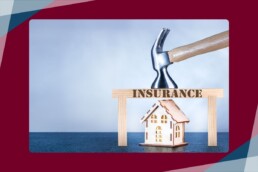A Beginner’s Guide to Buying Homeowners Insurance
Approximately 64% of homeowners do not have adequate coverage and the worse part is that their houses are often underfunded by 27%. So, what does this all mean?
Whether you own a primary residence or a rental property, you need homeowners insurance coverage to protect yourself from financial losses. You also need one to qualify for a mortgage, or you will miss out on the financial means necessary to purchase the home of your dreams.
If you are searching for the perfect homeowners insurance, continue reading to get more information.
What Is Homeowners Insurance?
Homeowners insurance policies cover the cost of repairing or replacing your home from catastrophes. It also covers medical and legal expenses if someone hurts themself on your property.
How Much Does Homeowners Insurance Cost?
Home insurance varies significantly based on the age, size, and location of the house. It also depends on the probability of a weather catastrophe occurring in your region. On average, it may cost around $100 and $170 per month.
Keep in mind, the level of your deductible will most likely influence your monthly rates. The greater the deductible, the cheaper the rates.
Determine the Extent of Your Coverage Requirements
47% of homeowners are unaware of the coverage provided by their home insurance policy. Keep in mind that not all home insurance plans are created equally, and the cost of your policy will vary depending on the level of financial protection you want.
Your home’s insurance coverage typically will include the following components:
Dwelling Insurance
This type of insurance protects against property damages. To calculate the amount of coverage you need in this area, you must first assess the cost of completely rebuilding your house. This is often referred to as the value of replacement.
Loss of Use
Loss of use protects you if your house becomes uninhabitable because of damage. It’s often bundled with dwelling coverage, accounting for about 20% of your dwelling coverage.
Personal Property Coverage
This coverage protects you against personal property damages in your home. To determine the amount of coverage, you need, do an inventory check and estimate the cost of replacing your high-value possessions if they were to be damaged.
Liability Coverage
This coverage protects you in the event of an injury on your property. Calculating the amount of liability coverage you may need is challenging since it is almost impossible to anticipate someone’s injuries if something were to happen to them anywhere on your property.
Most home insurance plans include at least $100,000 in liability coverage, so it never hurts to get more coverage if you can afford it. This is especially true if your home has a swimming pool or other potential hazards.
Determine if You Need Extra Coverage
In most cases, homeowners insurance will cover damages caused by wind or fire, but not flooding. The same is true if your house suffers damages from an earthquake, which is often not covered by regular homeowners insurance.
You must determine whether to purchase extra coverage for these particular occurrences. If you live in a flood zone or earthquake-prone area, then you should consider the additional coverage.
Take Measures to Reduce Your Insurance Premiums
Making your house extra safeguarded may help you get the most affordable homeowners insurance available. It may be worthwhile to invest in features that will lower your premiums, such as:
- A security or alarm system
- Storm shutters or other forms of window protection
- A fence around your property or encircling your pool
- Leak Detection Sensors in and around water fixtures
Updating some aspects of your house may also help you save money on insurance. For instance, replacing an older roof with a modern one may result in lower rates. However, the money invested in such a large repair may take years to recover in insurance savings.
Should You Get Home Insurance Directly or Through a Broker?
You don’t need an insurance broker to buy homeowners insurance, as you can do an internet search for several insurance providers, contact them directly, and receive estimates. However, if you want to outsource this procedure, hiring a broker may make sense.
A broker can get estimates and assist you in narrowing down your choices. Since brokers are not affiliated with particular insurers, they will usually provide you with various options.
Evaluate Your Alternatives
It’s usually prudent to get several quotes when searching for homeowners insurance. Once you’ve gathered all the information, you’ll need to choose the most appropriate insurance plan that fits your needs.
One particular point to consider is your policy’s deductible, which is the amount you’ll be responsible for paying out of pocket each time you make a claim with your insurer. A policy with a cheaper premium may have a larger deductible, which means you will save money in the years when you do not need to make a claim, but alternately you will pay more when you do.
Prepare for a Home Inspection
Many homeowners insurance providers will examine your house before completing your policy. This way, they can verify the information you’ve given them regarding your home.
If an insurance company representative discovers that some elements of your house are more out-of-date or dangerous than you indicated, your premiums may increase. If the information is inaccurate, the premium rate might also increase. On the flip side, if your inspector sees specific safety improvements, such as a fence around your swimming pool, your charges may decrease.
What Is Not Covered by Most Homes Insurance?
Homeowners insurance protects the structure of your house, the goods inside it, and provides liability protection during unforeseen circumstances. However, it does not cover these items and accidents:
- Floods
- Earthquakes, landslides, and sinkholes
- Sewer backups
- Canine attacks
- Expensive jewelry
Shopping for Insurance: Where to Get the Best Coverage?
Mother nature is unpredictable, and the unexpected happens. You want the best homeowners insurance to cover life’s many twists. Insurance shopping can be challenging, but it doesn’t have to be.
You can look through an extensive insurance buying guide and get overwhelmed, or simply contact Oliver L.E. Soden Agency for a quote and consultation.
Related Articles
The Importance of Contractual Risk Transfer in Contractor/Subcontractor Relationships
In the construction industry, managing risk is crucial for the success and sustainability of any project. Contractual risk transfer is a vital strategy…
What Are Group Captives?
Group captives are a form of captive insurance where multiple organizations from similar industries form a single insurance entity. Unlike…


